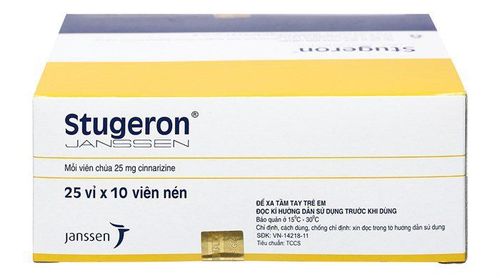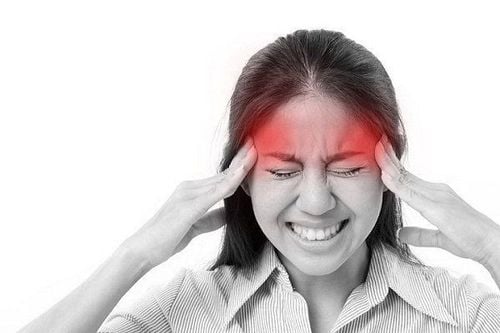This is an automatically translated article.
Tension type headache is a common condition in daily life and can be encountered in any audience regardless of age and gender. Although the disease is not directly life-threatening at first, it has a negative impact on the patient's health and mental health.
1. Overview of tension-type headaches
A tension-type headache is a painful condition caused by muscle spasms in the scalp, face, or neck. When the patient is in a state of stress or anxiety for a long time, these muscles will become tight, causing pain.Tension-type headaches are considered the most common type of headache, followed by migraine headaches and 5th neuralgia. Currently, the exact cause of the disease is not really clear, but according to the available studies, it has been found that the disease has many associations with psychological stress factors.
Tension type headaches can be divided into 3 main types:
Irregular cyclical headaches: occasional headaches that come on and come on randomly. Frequent Cyclical Headaches: The pain occurs in episodes lasting from 30 minutes to 7 days in a cycle of 1-14 episodes/month. Chronic headache: pain occurs continuously and can last for hours with a cycle of 15 times / month, and sometimes accompanied by a feeling of nausea.
2. Causes of tension-type headaches
2.1 Psychological stress (stress)
Right from the name, it can be seen that psychological stress is one of the main causes of tension-type headaches. When the body is in a state of stress, the nervous system will secrete a large amount of the hormone Cortisol, and the need to absorb energy from fat also increases continuously.
This leads to increased blood pressure and makes the heart beat faster than normal. At that time, the blood circulation is also disturbed and creates high pressure on the vessel walls.
Stress is actually the way people see, behave and react to problems in daily life. Stress alone is classified as one of the urban diseases because the noisy and busy life in the city creates favorable conditions for the disease to develop.

Stress là nguyên nhân gây đau đầu týp căng thẳng
2.2 Weather change
In cases that are sensitive to unusual changes in climate, humidity, temperature or air pressure, changes in weather can also lead to tension-type headaches. This condition is common in the elderly and in women.
For example, when the weather is too hot, the body loses water, stress leads to difficulty sleeping, insomnia. The lack of sleep for a long time negatively affects the nervous system, creating long-term headaches that gradually turn into chronic headaches.
2.3 Vestibular disorders
When the nervous system is damaged by stress syndrome, it will cause vestibular disorders.
In the nervous system, the 8th nerve plays a role in transmitting information but encounters negative effects that lead to damage. Then the functioning of the vestibular system will become inaccurate and disordered. From there, it causes manifestations such as stress, anxiety, insomnia and especially long-lasting headaches and fatigue.
2.4 Some other factors
There are also a number of other factors that can lead to tension-type headaches such as:
Abuse of stimulants (alcohol, beer); Life and work pressure; Head trauma and collision; Maintaining one position for too long; Effects of noise pollution.
3. Clinical symptoms of tension-type headache
Clinical and subclinical symptoms of tension-type headache commonly seen are:
The head always feels like a rope or towel is tight; Concentration, memory decline; Long-lasting dull headache, sometimes even pain in the nape of the neck; Difficulty sleeping, frequent insomnia; When stressed, tired or exposed to loud noise, pain levels increase; There is a feeling of tightness in the muscles of the head - face - neck; Sometimes it feels like a knock in the head. Typically, the symptoms of a tension-type headache will last for several hours. Initially, the pain can be relieved within 3 days - 1 week if the patient uses pain relievers continuously. However, then the pain will continue to repeat over and over again. Therefore, the patient should see a doctor immediately if the pain is aggravated and accompanied by many symptoms such as vomiting, weakness in the limbs, ...

Mất ngủ là triệu chứng của đau đầu týp căng thẳng
4. Diagnosis and treatment of tension-type headache
4.1 Diagnosis of tension-type headache
To diagnose tension-type headache, the patient will usually be asked a number of related questions by the doctor to provide information and basis for the diagnosis.
Location, degree of pain and pattern of pain; Time of onset of pain ; Accompanying symptoms; Previously used medications; Personal and family history of headache; Level and likelihood of stress in work and life.
4.2 Treatment of tension-type headaches
Tension headaches can be relieved through a number of measures such as:
Using pain relievers such as: Ibuprofen, Aspirin, Acetaminophen as prescribed by the doctor; There is a mode of exercise and sports in moderation and relaxation; Exercise physical therapy or resort to the intervention of devices to reduce muscle contractions. Tension type headache with unclear symptoms, can easily be confused with common headaches that make patients subjective. Therefore, when there is any suspicion of tension-type headache, patients should immediately go to medical facilities for examination and definitive treatment methods soon.
Neurology Department is one of the prestigious departments trusted by patients of Vinmec International General Hospital. The doctors of the department are all reputable, highly qualified in the industry, rich in experience, with the heart and mind to help diagnose and provide the most effective treatment for patients.
Neurology is part of the clinical medicine division, holding specialized functions in the examination and treatment of diseases related to the central nervous system (skull, meninges, brain, cerebral blood vessels, nerves). in the skull, pituitary gland, spine, discs, spinal membranes) and the peripheral nervous system (the nerves and ganglia outside the brain and spinal cord).
To register for examination and treatment at Vinmec International General Hospital, you can contact the nationwide Vinmec Health System Hotline, or register online HERE.













